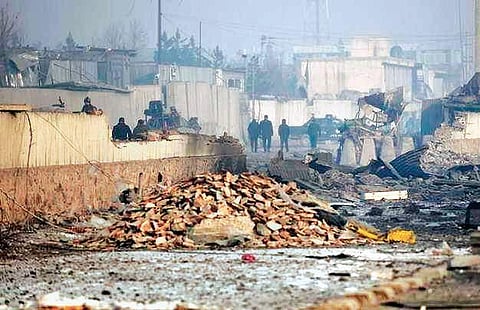

Mumbai-based journalist and author Taran N Khan recently released her personal memoir of travelling alone on foot through war-torn Kabul.
Khan, whose works have been widely published in India and internationally, spent long periods of time between the years 2006 and 2013 working with Afghan media professionals in Kabul.
The book took shape as a series of her firsthand essays based on these encounters.
India shares several cultural connections with Afghanistan.
In the 1970s, there was an exodus of Afghan refugees who fled from Kabul to Delhi during the Taliban rule.
By 2006, nearly three million refugees returned to their country following the Taliban’s defeat. After decades of war, there was a rush of foreign aid to rebuild the country’s ruined economy.
When the author first arrived in Kabul in 2006, five years after the Taliban government was overthrown, one of the first things she was cautioned about was to never walk.
However, as a Muslim woman raised in small-town India (incidentally, Khan’s father’s family descended from the Pashtuns, or Pathans as they are called in India), many things about Kabul reminded her of her own hometown, Aligarh.
The book, in which each of the chapters explores different themes, is a riveting account of the author’s several walks through the city over the years, exploring its various facets—its monuments, bazaars, bookshops, graveyards and street cafes—often drawing comparisons between them before and after the Taliban regime.
She beautifully likens the experience of walking in the city to that of looking through a kaleidoscope—where fragments fall into place and the familiar appears new.
The author begins by walking the reader through Kabul’s history, relating its stories and storytelling tradition through well-known tales such as Kabuliwala, The Kite Runner and Baburnama as well as Sufi poetry by celebrated Persian poets such as Jalaluddin Rumi, Abdul Qadir Bedil, Mirza Ghalib and Abul-Qâsem Ferdowsi Tusi.
In one of the chapters, the author analyses the acute problem of drugs, its rampant trafficking and addiction among the country’s men, women and even children—stemming primarily from their need to escape an uncertain reality.
Khan also examines how romance plays out almost as a secret language through the city’s streets.
She discovers that weddings, in contrast, are the other extreme—extravagant manifestations of love and symbols of one’s status and wealth.
In fact, among the first things to boom in Kabul post the overthrow of the Taliban regime was the marriage market, with the mushrooming of magnificent wedding halls across the city as well as a network of associated enterprises, such as clothes boutiques, beauty parlours, cake shops and decoration centres for cars.
As she wanders further, the author comes across crumbling cinema halls that were destroyed by the Taliban who are averse to films and entertainment.
Ironically, she notes the locals’ fascination for Bollywood films, which they still manage to watch, though surreptitiously.
“In a city where reality is often tentative and brittle, fantasy can offer more dependable terrain,” Khan observes, a sentiment that often strongly resonates with India too.
She delves further to get a taste of the Afghan film industry and even witnesses the shooting of one of its films.
Finally, the author finds that to be lost in Kabul is to find it; and to leave it, is to take it along with you.
Shadow City: A Woman Walks Kabul
By: Taran N Khan
Publisher: Penguin India
Pages: 239
Price: Rs 599